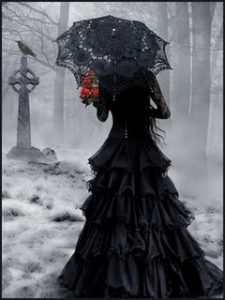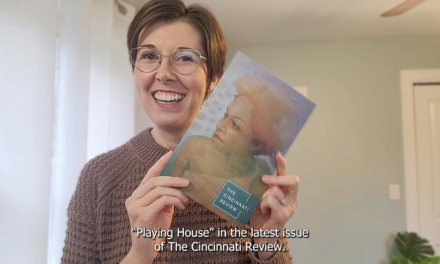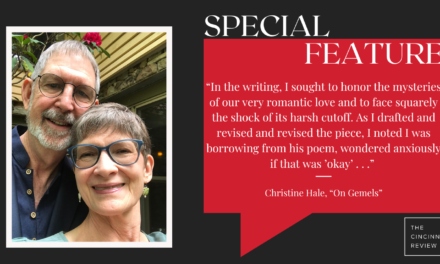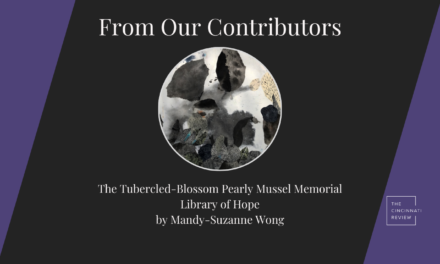We just got our final proof from the printer, which means that Issue 9.2 will soon be trucking toward us (you can order the issue here). There’s a kind of grief in every transition; we mourn what’s passing as the new thing emerges, so we find ourselves decked out in black for the final few weeks of glory for  the current issue. These five contributors to 9.1 write about more profound kinds of grief, and we’re thankful they’ve shared this commentary about their pieces:
the current issue. These five contributors to 9.1 write about more profound kinds of grief, and we’re thankful they’ve shared this commentary about their pieces:
Rebecca Black: “Lament for the Makers” is a hybrid of two failed poems, written over eight years apart, both parts written before I had a child, but only juxtaposed in the months right after my son was born. People always say “You’ll understand x, y, or z about your parents when you have children of your own,” and I always hated the sanctimony of that statement. The truth is, you do have new visions about your parents after you have a child of your own, but they are not the perspectives anyone expects, predicts, or particularly desires. This poem is a proto-elegy for my father, who has lived ten years after a paralytic stroke. He always wanted me to be a writer. I have a fear that I won’t be able to write about him after he dies, so I’m trying to do it now.
Lucille Lang Day: One night my husband and I were talking about Haiti, and I wanted to reread the short story “Ti-Moune” in Love & Like by Herbert Gold, so I went to the bookshelf where I thought the book should be. It wasn’t there, nor was it anywhere among my husband’s and my books. While I was looking for it, I noticed that many other books of mine had gone missing. I felt devastated and started to cry. Some of the missing books had been inscribed to me, and one was a collector’s edition of Jane Eyre that had belonged to my father. A villanelle seemed like a fitting way to mourn them, so I wrote “The Lost Books.” Later I found some of the missing books in boxes in the basement that I had packed and forgotten about, but others never turned up. I fear they were in a box that mistakenly got sent to the Salvation Army during one of our periodic basement cleanouts. I hope someone, somewhere is enjoying them.
Eric E. Hyett (on “Like Leaves”): It’s amazing the tricks grief can play. This poem, perhaps more than any I’ve ever written, was very much influenced by my colleagues in the Workshop for Publishing Poets. It started with otters. I thought I was writing about otters—their gallant rituals, their orderly dance. That lasted a draft or two. Then my friend and fellow poet Matthew Sisson told me—out of the blue— to change the word “otters” to “watch”—the worst thing about losing your watch. That felt truer somehow, since people do lose watches, and also it gave me something about hands making wide circles. The poem stayed that way (“watch”) for a few dozen more drafts, during which it became a pantoum, and then NOT a pantoum (I love the repetition that the pantoum form brings, but it was too weighty for this poem to bear). Then, perhaps around draft 200, I was up late revising and changed “watch” to “son,” and suddenly there was the poem—the worst thing about losing your son . . . It had been there all along, but I needed to come to it circuitously and by following what felt bearable at each step of the way. Matthew was right; it wasn’t about otters. It’s amazing the tricks grief can play.
Richard Lyons (on “I Will Begin”): I wrote this poem, and several like it, after I had decided to eschew the stanza break for a while. I wanted to chant as Whitman, Stern, and O’Hara do, and I was re-immersing myself in the sensual rituals and rites of Odysseas Elytis’s poems. I was half serious and half not about the efficacy of amulets, but I thought the chanting would open me up and my poem up to the chances of magic or fate or any force outside my own desires. I am pleased that this poem “I Will Begin” evolved into a failed exorcism or a failed catharsis. I am pleased that this poem’s escape from uglier emotions owns up to those emotions. I am currently working to articulate a sense of the tribal in my poems without lying about the speaker’s fear and rage.
I am mourning the loss of Adrienne Rich, but her poems will endure without any help from me. In my life and in my poems, I hope to explore the complexities behind her line: “That intricate losing game of innocence long/ overdue.”
Michael McFee (on “Dust to Dust”): Last year, I decided to thin out the books on my overcrowded shelves, to sell or donate the volumes I really didn’t need to surround myself with anymore. It’d been many years since such a winnowing, and so I slipped each book out, considered it, then wiped off its edges with a rag before either returning it to the freshly-dusted shelf or adding it to the teetering stack of rejects. Somewhere toward the end of this slow and increasingly tedious process—weeks of sneezes, tissues, and sore knees—I finally realized: There’s a poem here. It wasn’t so much about me (yawn) as about a man who buys and organizes books on shelves all his life, but never really reads them as planned, and then his family has to deal with those dusty volumes after his death. (Okay, maybe it is about a version of me, but I hope it’s also about all of us readers and writers and lovers of the endangered book, that precious ink-and-paper literary artifact we can hold in our hands, its “written, printed,/ bound, forgotten words” as close as we may come to immortality.)










